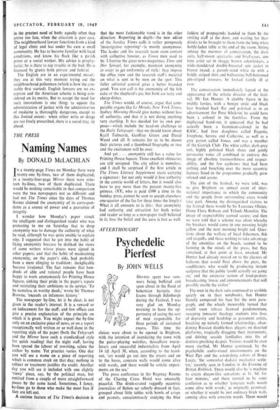Naming Names
By DONALD McLACHLAN
TN a twenty-page. Times on Monday there were Itwenty-one by-lines, two of them duplicated; in a twenty-four-page Mirror there were nine- teen by-lines, two of them duplicated. There would be nothing remarkable in that comparison were the two newspapers not so different and had not The Times since the days of Thomas Barnes claimed the anonymity of its correspon- dents as a source of power and a guarantee of integrity.
I wonder how Monday's paper struck the intelligent and distinguished reader who was protesting to me on Saturday that to drop anonymity was to damage the authority of what he read, although he was quite unable to explain why. I suggested that he got into the habit of liking anonymity because he disliked the views of some writers whose pieces were signed in other papers; and that the habit of maintaining anonymity, on the paper's side, had probably been a mere clinging to tradition: inexplicable because irrational. The fact remains that hun- dreds of able and rational people have been happy to work anonymously for Printing House Square, sinking their pride in the paper's repute and restricting their ambitions to its service. 'To be nameless in worthy deeds,' wrote Sir Thomas Browne, 'exceeds an infamous history.'
The newspaper by-line, let it be clear, is not given in the reader's interest. It is a reward or an inducement for the staff; and few offices can give a precise explanation of the principle on which it is given. You might expect the by-line only on an exclusive piece of news, or on a report exceptionally well written or so well done in the reporting style of the paper (both the Telegraph and the Mirror have such a standardised style for quick reading) that the night staff, having been spared the labour of rewriting, salute the author by name. Yet practice varies. One day you will see a name on a piece of reporting which is common stock on that day; nothing in subject or treatment justifies the credit. Another day you will see it included with one slightly `viewy' piece, say, by the political man, but omitted from a couple of more straightforward pieces by the same hand. Sometimes, I fancy, by-lines go to those who make the most fuss if they are left out.
A curious feature of The Times's decision is that the most fashionable trend is in the other direction. Reporting in depth—the new editor of the Sunday Times calls it rather pompously `investigative reporting'—is mostly anonymous. The leader and his research team seem content with collective honour, as Times men used to be. Likewise the great news-magazines, Time and Der Spiegel, for example, maintain anonymity in order to get uniformity of style: they impose the office view and the research staff's material on what is sent in by men on the spot. This fuller editorial control gives a better branded good. You can call it the anonymity of the fish cake or the shepherd's pie, but both are tasty and cheap dishes.
The Times would, of course, argue that com- parable organs like Le Monde, New York Times, Sydney Morning Herald give names without loss of authority, and that it is not doing anything very startling. It has decided for its own pur- poses—which include the head-on challenge to the Daily Telegraph—that we should know about Kyril Tidmarsh, Geoffrey Green and David Wood and all. It remains for us to be shown their pictures and a thumbnail biography or two and the excitement will be over.
And yet . . . anonymity still has a value for Printing House Square. Those excellent obituaries are still unsigned. The city editor is nameless; and I shall be surprised if the first article in The Times Literary Supplement starts carrying a signature: for not only would it lose authority in the coterie world of letters, but it would also have to pay more than the present twenty-five guineas. (XY, who is paid £100 a time in the Sunday press, cannot be seen to accept elsewhere one-quarter of the fee for three times the length.) What it all amounts to is this: that anonymity had authority and attraction for both writer and reader so long as a newspaper itself believed in it; lose the belief and the aura is lost as well.


































 Previous page
Previous page